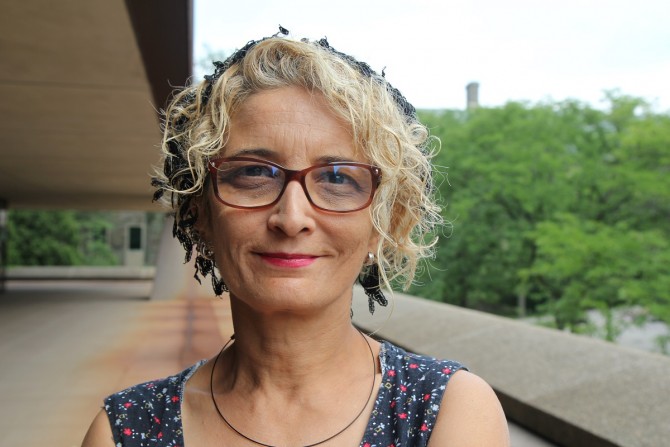Turkish researcher becomes her own subject
By Jonathan Miller
As a political scientist studying the relationship between academia and government, Simten Coşar knew a lot about the ways in which official ideology can undermine academic independence.
Her doctoral thesis was a study of the state and the intellectual in Turkey. As a professor in Ankara, she advised graduate students, wrote articles and books and lectured widely on politics, media and the academy. A self-defined structuralist and feminist, Coşar grounded her work in both fact and theory.
She was also involved with Scholars at Risk, an international network that provides support for threatened academics around the world. From the relative safety of Turkey, she wanted to show solidarity for colleagues in authoritarian states.
Then, in January 2016, things suddenly got personal.
That was when Coşar joined 1,128 Turkish academics in signing a declaration, titled “We Will Not Be a Party to this Crime,” calling for the government to stop its attacks against minority Kurds. Soon more than 2,200 would sign.
The reaction to the declaration was swift, led by extreme nationalist groups with ties to the government of Recep Tayyip Erdoğan. “There was a public campaign accusing the signatories of supporting terrorist activities,” Coşar recalled from her office at the Cornell Institute for European Studies(CIES).
“Just with a click, I was turned into a field of research myself,” she said. “It was what we had been talking about in the abstract turned into practice.”
Across Turkey, university administrators began firing faculty members after hasty hearings. “Some of my colleagues were not only being investigated by their universities, but they were being called to the criminal court,” she said. “In a country where war is not that unusual, where state violence is not that unusual, a call for peace is annoying for the authorities. So they attacked.”
The crackdown took her by surprise. “At first it was just pure fear,” she said. “Fear of being arrested, fear of being dismissed, but mostly the unease of not being able to foresee what was going to happen. This lasted for about a month, or a month and a half, and then I got tired of it. It does not help, it paralyzes you, it consumes you. So I started to get involved in solidarity networks in Turkey. And I started to write.”
By that time, she was on sabbatical at the University of Massachusetts, Amherst, working on a project about feminist academics in the United States. When her time at UMass was over, she thought about returning home, but opted to take a visiting professor position at Carleton University in Ottawa, Canada, where she taught until the end of last year.
She is not banned from traveling to Turkey – in fact, she was there in May to help care for a family member. She found the political situation dire, but she was heartened by signs of what she calls “the micropolitics of hope” – the fact that academics, political dissenters and other marginalized people have found ways to stay active despite the limitations placed on them.
But the uncertainty makes it hard for her to focus on her work there. “I was not able to write in my country,” she said. “It was not like someone stopped me from writing, but I couldn’t start.”
This winter, she came to Cornell as a visiting scholar with CIES, with support from the Office of the Vice Provost for International Affairs, the Mario Einaudi Center for International Studies and the Institute of International Education’s Scholar Rescue Fund.
At Cornell, she said, the words have flowed.
“It has been amazing,” Coşar said. “I have been able to do the things that I wasn’t able to do for the last two and a half years. I completed manuscripts, I applied for research funds, I submitted a book proposal. The academic environment is so hospitable here. My colleagues are friendly and supportive and understanding. I cannot help but write, and the subjects that I am studying are right at the center of what is happening.”
That is exactly what CIES director Esra Akcan had hoped for. “Scholars with the courage to speak out against repressive regimes are increasingly under threat worldwide,” she said. “Cornell is well-positioned to provide a supportive community for these academics, and the space to continue their research, teaching and activism.”
Since 2004, the university has welcomed four researchers under the Scholar Rescue Fund program. Last year, CIES hosted Azat Gündoğan, a sociologist from Turkey who had also signed the so-called peace declaration.
Under Erdoğan, Turkey has become an international battleground for academic rights. Since 2016, an estimated 6,000 researchers, teachers and others have lost their jobs at Turkish universities because of their political views. Having experienced the crackdown firsthand, Coşar has been struck not just by the numbers, but by the emotional effects.
“You cannot be sure of yourself, how democratic you are, how egalitarian you are, until you are pushed into a situation where your principles are tested,” she said.
Coşar sometimes questions her own response. “After a year or so in North America, I still feel that divide in myself, asking whether I would rather be in my country, directly involved in the solidarity networks, rather than being abroad. But for now the balance is tipping toward staying away. Perhaps I’m being selfish.”
After a pause, she adds, “I’m always critical of myself, but my conscience is okay.”
It helps that she and her dog have found a place where they feel at home. “I love Ithaca,” she said with a smile. “There’s a sense of community here. And Cornell is a great place for academic production.”
Jonathan Miller is associate director for communications at the Einaudi Center.
Media Contact
Get Cornell news delivered right to your inbox.
Subscribe

